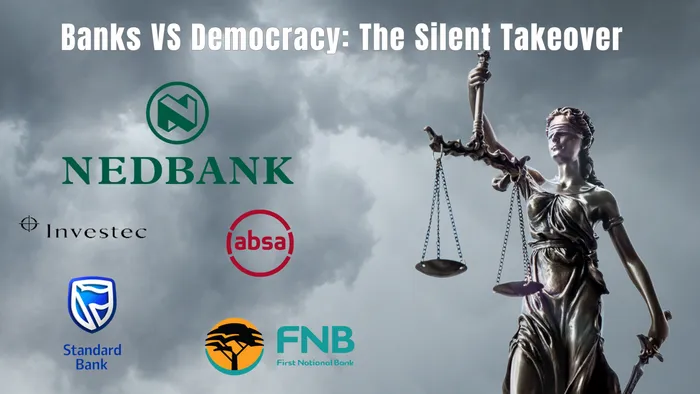How Banks Are Weaponising Financial Power to Undermine Democracy

Parliament must act decisively to safeguard democracy by curbing the unchecked influence of banks, says the writer.
Image: Independent Newspapers
By Sipho Tshabalala
Imagine a world where banks wield the power to silence political voices they disagree with, not by engaging in debate or dialogue, but by cutting off their access to financial services. That dystopian vision isn’t as far-fetched as it might seem. In South Africa, banks have increasingly weaponized their ability to close accounts, targeting politicians and political parties under the flimsy guise of “reputational risk.” This alarming trend is more than just a threat to individuals—it is a direct assault on the foundations of democracy itself.
At its core, democracy thrives on the ability of all voices, regardless of their ideology, to participate in the political arena. It is a system that guarantees freedom of expression, debate, and dissent. Yet, when banks decide to close the accounts of politicians, political parties, political enemies, etc. based on disagreements with their policies, they position themselves as gatekeepers of democracy, a role they have neither the mandate nor the moral authority to assume.
The term “reputational risk” has become the banks’ favorite euphemism, a catch-all justification that is as nebulous as it is dangerous. It allows them to act as arbiters of morality, silencing voices they find inconvenient. This practice is not only undemocratic but deeply hypocritical. These same banks have been implicated in scandals involving corruption, money laundering, and even collusion to manipulate the currency. If reputational risk were applied consistently, one might argue that these institutions should have shut down their own accounts years ago.
The precedent being set is chilling. If banks can close accounts based on ideological disagreements, what stops them from targeting activists, civil society organisations, or even voters? The power to unbank is the power to disenfranchise. It transforms financial institutions into tools of coercion, undermining the very principles of representation and accountability that democracy is built upon.
Consider this: a political party challenges the status quo, advocating for policies that threaten the entrenched interests of powerful elites. The banks, aligning themselves with those interests, decide to cut off the party’s access to financial systems. Without banking services, the party cannot pay staff, run campaigns, or even accept donations. In essence, the banks have vetoed their participation in the democratic process, effectively silencing dissent and stifling competition. This is not a hypothetical scenario—it is a reality that looms larger with each passing day.
The danger of this unchecked power becomes even more apparent when viewed against the backdrop of South Africa’s political and economic landscape. Banks have long been accused of operating as extensions of elite interests, using their influence to shape policies and protect their own bottom line. The ability to unbank politicians and political parties gives them a weapon to suppress those who dare to challenge this status quo. It is a direct affront to the principles of equality and fairness that democracy demands.
History is rife with examples of financial institutions aligning themselves with oppressive regimes or exploiting their power to undermine political movements. From apartheid-era banking practices that propped up an illegitimate government to the global collusion uncovered in scandals like the manipulation of the rand, banks have often been complicit in undermining justice. Today, the same institutions claim the mantle of impartiality while exercising a power that threatens to erode democracy from within.
The ramifications of this power extend far beyond the immediate targets. When financial institutions can unilaterally decide who gets to participate in the political process, they undermine public trust in both the banking system and democratic institutions. The result is a society where power is concentrated in the hands of a few, while the many are left disenfranchised and voiceless.
Legislators must confront this issue with the urgency it demands. The Zondo Commission’s recommendations for reform provide a crucial starting point, but more is needed. Parliament must enact laws that prohibit the arbitrary closure of accounts based on subjective criteria like reputational risk. Clear, transparent, and enforceable standards must be established to ensure that banks cannot use their power to interfere in the democratic process.
The argument that banks are private entities free to choose their clients is a hollow one when those choices have profound public consequences. Financial institutions are not ordinary businesses; they are integral to the functioning of society. Their actions have ripple effects that extend far beyond their boardrooms, shaping the economic and political landscape in ways that demand accountability.
Democracy is not just about voting; it is about creating an environment where all voices can be heard, all ideas debated, and all policies challenged. When banks undermine this environment, they strike at the heart of what it means to be a free and fair society. South Africa cannot afford to let its democracy be held hostage by institutions that prioritize profit over principles.
The power to close accounts is the power to silence. It is a power that no unelected, unaccountable entity should wield. Parliament must act decisively to safeguard democracy by curbing the unchecked influence of banks. The future of South Africa’s political landscape—and the integrity of its democratic institutions—depends on it.
* Sipho Tshabalala is an independent writer, commentator, and political analyst.
** The views expressed do not necessarily reflect the views of IOL or Independent Media.